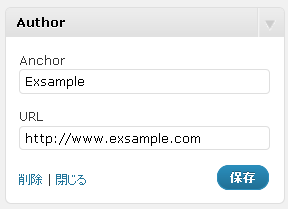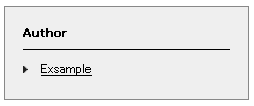ウィジェット : WordPress
カスタムなウィジェットを作成する際の覚書。
ウィジェットエリアが1つの場合
ウィジェットの設定 functions.php
register_sidebar();
functions.phpに上記のコードを記述する。コードを記述すると管理画面の[外観] > [ウィジェット]でウィジェットを設定できる。
利用可能なウィジェットをサイドバー1へドラッグして追加する。
ウィジェットを表示(テンプレートファイルに記述)
テンプレートファイルに下記のコードを挿入する。
<?php dynamic_sidebar(); ?>
register_sidebar($args)関数の詳細
register_sidebar関数は引数に配列($args)をとる。引数は省略可能。
省略した場合のデフォルト値は下記のようになる。
<?php $args = array(
'name' => sprintf(__('Sidebar %d'), $i ),
'id' => 'sidebar-$i',
'description' => ''
'before_widget' => '<li id="%1$s" class="widget %2$s">',
'after_widget' => '</li>',
'before_title' => '<h2 class="widgettitle">',
'after_title' => '</h2>'
); ?>
初期値からわかるようにウィジェットはliタグでマークアップされる。見出しはh2タグでマークアップされる。
__()関数はSidebarをサイドバーへ変換する(日本語へ変換)。サイドバーが1つの場合はnameの値であるsprintf(__(‘Sidebar %d’), $i )はサイドバー 1となる。
またidの値はsidebar-1になる。
'name' => sprintf(__('Sidebar %d'), $i ),
'id' => 'sidebar-$i',
» “__()”関数や”_e()”関数とはなんぞや【WordPress】 – ウェブなとき。
» PHP: sprintf – Manual
dynamic_sidebarの詳細
<?php dynamic_sidebar(); ?>
ダイナミックサイドバー(ウィジェットが配置されるサイドバー)を表示する。ダイナミックサイドバーは下記の記載方法が推奨されている。
<ul id="sidebar">
<?php if ( !function_exists('dynamic_sidebar') || !dynamic_sidebar() ) : ?>
<li>{static sidebar item 1}</li>
<li>{static sidebar item 2}</li>
<?php endif; ?>
</ul>
» 関数リファレンス/dynamic sidebar - WordPress Codex 日本語版
ウィジェットエリアが複数の場合
ウィジェットの利用
register_sidebar(); // ウィジェットエリア1 サイドバー 1を表示する。
register-sidebar(); // ウィジェットエリア2 サイドバー 2を表示する。
ダッシュボード [外観] > [ウィジェット]にサイドバー 1・サイドバー 2が表示される。
利用できるウィジェットからサイドバー 1・サイドバー 2へウィジェットを追加する。
ウィジェットの表示
index.phpに下記のコードを挿入する。
<?php dynamic_sidebar(1); //サイドバー1を表示 ?>
<?php dynamic_sidebar(2); //サイドバー2を表示 ?>
カスタムウィジェット
<
p>ウィジェットには雛型が用意されている。
class My_Widget extends WP_Widget {
function My_Widget() {
// widget actual processes
parent::WP_Widget(false, $name = 'MyWidget');
}
function form($instance) {
// outputs the options form on admin
}
function update($new_instance, $old_instance) {
// processes widget options to be saved
}
function widget($args, $instance) {
// outputs the content of the widget
}
}
//ウィジェットの登録[1]
add_action('widgets_init', create_function('', 'return register_widget("My_Widget");'));
widget($args, $instance)関数
widget関数の引数$args, $instanceはWordPressから渡される。
$argsはウィジェット情報、$instancdはフォーム情報が設定されている。
上記雛型を例にとると$argsには下記のような情報が設定されている。
'widget_id' => ○○○-N[2],
'widget_name' => ×××[3]
» WordPress ウィジェット API - WordPress Codex 日本語版
1. register_widget('My_Widget');でもよい。
2. ウィジェットの雛型を例にすると○○○はmy_widgetになる。Nは整数でWPが自動的に設定する。
3. ウィジェットの雛型を例にすると×××はMyWidegtになる。
簡単なウィジェット
著作者のリンクを表示するウィジェット


<?php
/**
My_Widget
*/
class My_Widget extends WP_Widget {
/** constructor */
function My_Widget() {
parent::WP_Widget(false, $name = 'Author');
}
/** @see WP_Widget::widget */
function widget($args, $instance) {
extract( $args );
echo $before_widget;
echo $before_title . 'Author' . $after_title;
if (!$instance['anchor']) {
$anchor = 'FindxFine';
$url = 'https://www.findxfine.com';
}
else {
$anchor = $instance['anchor'];
$url = $instance['url'];
}
if ($url) {
$html = '<a href="' . $url . '">' . $anchor . '</a>';
} else {
$html = $anchor;
}
?>
<ul><li><?php echo $html ?></li></ul>
<?php
echo $after_widget;
}
/** @see WP_Widget::update */
function update($new_instance, $old_instance) {
$instance = $old_instance;
$instance['anchor'] = strip_tags($new_instance['anchor']);
$instance['url'] = urlencode($new_instance['url']);
return $instance;
}
/** @see WP_Widget::form */
function form($instance) {
$anchor = esc_attr($instance['anchor']);
$url = esc_attr($instance['url']);
?>
<p><label for="<?php echo $this->get_field_id('anchor'); ?>"><?php _e('Anchor'); ?><input class="widefat" id="<?php echo $this->get_field_id('anchor'); ?>" name="<?php echo $this->get_field_name('anchor'); ?>" type="text" value="<?php echo $anchor; ?>" /></label></p>
<p><label for="<?php echo $this->get_field_id('url'); ?>"><?php _e('URL'); ?><input class="widefat" id="<?php echo $this->get_field_id('url'); ?>" name="<?php echo $this->get_field_name('url'); ?>" type="text" value="<?php echo(urldecode($url)); ?>" /></label></p>
<?php
}
} // class My_Widget
register_widget('My_Widget');
// register My_Widget widget
//add_action('widgets_init', create_function('', 'return register_widget("My_Widget");'));
?>
$instanceはフォーム情報が入っている。画像の例では$instance['anchor']はExsample, $instance['url']はhttp://www.exsample.comが設定される。
コメント
No comments yet.
コメントの投稿
改行と段落タグは自動で挿入されます。
メールアドレスは表示されません。